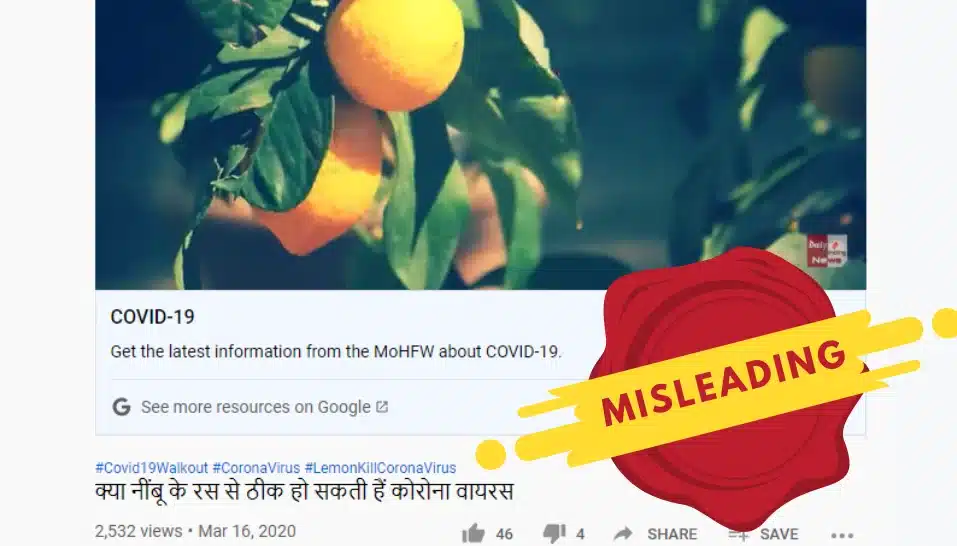Since the beginning of the pandemic, more than 10 fake claims citing the medicinal properties of lemon or drinking hot lemon juice or mixing lemon with soda, tea have been doing rounds. A new claim saying that washing hands with lemon juice can protect from coronavirus is unsubstantiated. We found that there is no study or data to back up this claim.
A video on a popular Youtube channel claims that “washing hands with lemon will protect you from coronavirus”. This video is getting wide popularity with more than 2.5 thousand views and a number of shares. The video refers to a study which has claimed that lemon can be replaced with soap and water but gives no details or name of the research study. We searched the internet for the year 2017 research paper which is being referred to in the video and found none.

During the keyword search, we also found that a lot of fake and misleading claims about the efficacy of drinking lemon in different forms have been circulating but the truth remains that lemon has vitamin C which is an essential nutrient that can support immune function. However, there is no evidence from the current outbreak that eating lemon or washing hands with lemon (or mixing it with any other food product for that matter) has protected people from the new coronavirus.
We visited the World Health Organisation (WHO) and Center for Disease Control and Prevention’s (CDC) guidelines to ensure how true or false this claim is.
According to the CDC, washing hands with soap and water is the best way to protect yourself from getting sick – it’s one of the most effective ways to prevent the spread of germs. In case, there is no soap and water, hand sanitizer is a substitute but sanitizers won’t get rid of dirt, it can quickly reduce the number of germs on hands. According to the CDC, washing your hands for at least 20 seconds has been shown to remove more microbes than washing for shorter periods does.

The CDC has listed out a guideline on how to wash hands, why, and how. We thoroughly read the entire guideline but didn’t find a trace or a hint of using lemon to wash hands or using lemon as a substitute for hand sanitizer or soap or lemon being effective in stopping the spread of novel coronavirus.
Dr. Rohini Karandikar, science educator and a member of the Indian Scientists’ Response to COVID-19 team, with the Hoaxbusters’ group, said that “the novel coronavirus is stable between pH 3-10 according to this study. The pH of lemon juice is between 2-3, which will not destroy the virus”.
“Soaps and alcohol (present in sanitizers) can destroy the outer envelope of the novel coronavirus. Lemon juice has not shown to be doing the same”, Dr. Karandhikar added.
Therefore cleaning hands with alcohol-based hand rub or washing your hands with soap and water are the best ways to protect yourself from spreading the virus.
WHO has also stressed on hand hygiene and washing hands with soap and water is the most effective way to remove the virus.
Why this theory is easily acceptable but should not be!
Early in the 90’s (even till date in few cultures) in fine dining situations, providing finger bowls with a dash of lemon to wash hands was a common and widely popular ritual. These small bowls usually have lukewarm water with one-fourth piece of lemon dipped inside to help one get rid of oil which might have stuck to fingers while dining.
Since lemon is acidic in nature and has an advantage of reducing the cohesion of oil particles by breaking their bond strength; it is used to wash off the stickiness of oil. While it is true that lemon juice has anti-bacterial properties but not in sufficient strength. Acidic lemon juice is unfavourable to the growth of most microbes, though it doesn’t kill them directly.
Bottom line
Till date, neither WHO nor CDC has come out with any recommendation to highlight the effective properties of lemon in stopping the spread of novel coronavirus or replacing lemons for soap. No other substitute has been found or recommended till date. The claim is misleading and may compel people to stop using soap as an effective way to stop the spread of novel coronavirus.


















Add Comment